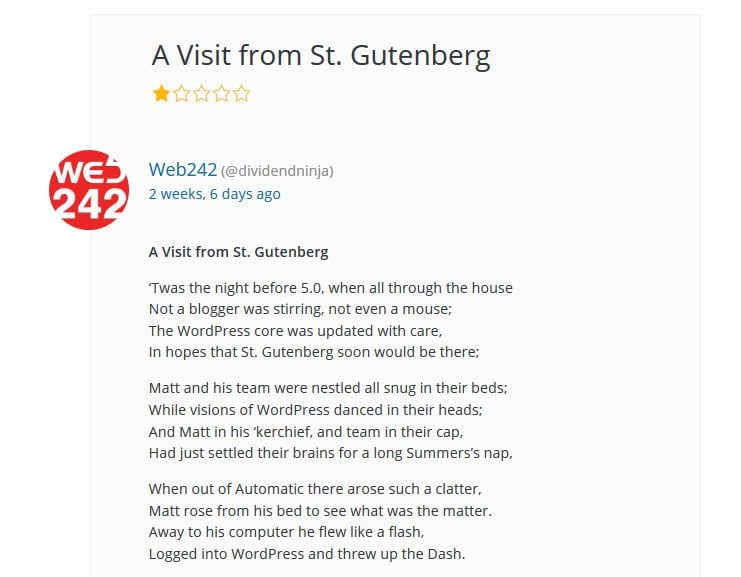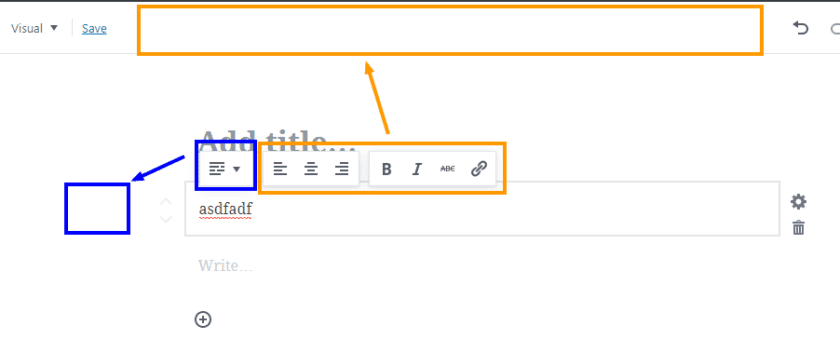Nothing is causing quite as much of an upheaval in the WordPress world as the Gutenberg editor. Revealed by Matt Mullenweg at WordCamp Europe 2017, the prospect of merging it into core for version 5.0 is causing quite a ruckus.
Not only will Gutenberg do away with the familiar TinyMCE content editor but also replace a whole bunch of other modules in the WordPress backend. If you believe the chatter around the web, it could be the end of WordPress as we know it.
The new editor is already available as a plugin along with a call to install it and provide feedback. By now more than 13,000 people have followed the call and the Gutenberg editor review count has gone up sharply.
Time to take a temperature test. In this post, we want to get a gauge on how the WordPress community feels about the upcoming change. For that, we have scoured the web for public opinions which we will try to summarize in this article.
We will look both at feedback in the WordPress directory as well as Gutenberg reviews from a number of reputable WordPress blogs. By doing so, we hope to find out what people like and dislike about Gutenberg as well as how they feel about making it part of the WordPress core.
Does the WordPress community give Gutenberg the thumbs up or thumbs down? We are about to find out.
The Big Gutenberg Editor Review Roundup
So, let’s look at how others feel about the new Gutenberg editor. For a first glance, we will start with the WordPress directory and the reviews plugin users have left there.
The WordPress Plugin Directory
At the time of this writing, the Gutenberg plugin has a rating of 2.3 stars. Overall, it has received 87 reviews with the following distribution of stars.

From here, you can already see a great division in the WordPress user base. Opinions are mostly on both sides of the extreme. It’s also apparent that currently, negative views somewhat outweigh favorable ones.
The Good
When digging a little deeper, those who like Gutenberg feel that it is a sensible next step in the evolution of WordPress. They express enthusiasm about the possibility of integrating the editing experience more closely with the end result and call Gutenberg intuitive to use and a simplification of other visual editors.
They also like the idea of content blocks and doing away with shortcodes. In addition, they praise the modern design and call it more beginner friendly than the current solution. Many also offer concrete ideas on what to improve.
However, even some five-star ratings already call for giving users the choice which editor they want to use. Solutions range from making it optional, leaving Gutenberg as a plugin or putting it into Jetpack instead of core.
The Bad
The negative reviews are a lot more vocal about this latter part. Overall, there are two main concerns. The way the editor works currently and what it means for the bigger picture.
Concerning the first part, many feel that Gutenberg is making things more complicated. They say it introduces more steps for tasks that are already simple to do in TinyMCE. Critics also talk of an overloaded user interface, the lack of intuitiveness and making everything a block, including bulleted lists. Many prefer the current editor’s resemblance of other word processors, especially because it’s easy to teach to clients.
When it comes to the bigger picture, we frequently hear concerns that the editor will take away the flexibility that WordPress currently offers. What often comes up is that Gutenberg will be good for bloggers but reduce the platform’s capabilities as a CMS.
The biggest fear, however, is that it will sacrifice backwards compatibility for an improved user experience and break millions of sites and plugins. Oh, yeah and somebody actually wrote a poem.

Overall, it’s clear that the WordPress community is divided and that so far the negative voices prevail. At the same time, the developers’ efforts to try and address concerns and ask for concrete feedback is to be commended. Alright, now on to other voices.
Please Don’t Include This in WordPress Core – Brenda Barron (WPMU DEV)
From the title of the post, you can already guess where this is going. While Brenda does mention that she likes the minimal writing interface, she is not a fan. The block architecture turns her off and she doesn’t feel like Gutenberg is an improvement on the existing interface.
In particular, her review mentions that creating and editing things like bulleted lists is a bit tedious. She also laments the absence of a copy and paste functionality and that inputting videos and other media is more complicated with the new interface.
Overall her opinion is not very positive even though she commends the effort of the developers. She concludes that she is highly in favor of leaving Gutenberg as an optional WordPress plugin.
Questions & Concerns From My First Impression of the WordPress Gutenberg Editor – Josh Pollock (Torque)
Josh Pollock starts off that he likes creating content with Gutenberg and is generally in favor of improving the current editor. However, he is concerned whether this is the way to go. One of his main concerns is that it might be a step back from a highly customizable content management system to a blogging platform.

His review praises the UI and says Gutenberg is definitely a good thing for writers. Yet, in his own words, he is “more concerned about everything around the writing process”. Josh especially addresses the issue of backward compatibility after the switch to a more JavaScript-based interface.
While he states that Gutenberg would be a chance to get over some of WordPress’ technical debt, he also cautions that maybe a more gradual approach would be better. Some type of middle ground between standardization and customizability.
Misunderstanding the Goal of the Gutenberg Experience – Chris Lema
Chris Lema was initially excited about trying out Gutenberg and taking WordPress in the direction of what makes Medium popular. However, in his opinion, right now it doesn’t hit the mark yet. Like Josh, his biggest concern is “didn’t we want to tell the world that WordPress was more than just for bloggers?”.
He agrees that for content creators, Gutenberg is a good thing. However, for creating pages and websites, it leaves much to be desired.
In fact, in his opinion Gutenberg doesn’t go far enough. Chris would like to see efforts go toward eliminating the dissonance between what you see in the editor and the finished product on the page. WordPress should aim for true what-you-see-is-what-you-get content creation. Currently, too much still depends on the theme.
Diving Into the New Gutenberg WordPress Editor – Brian Jackson (Kinsta)
Brian starts off stating that he likes the similarity between Gutenberg and the editing experience in Medium. He enjoys the additional writing space and the “writing first” attitude. Plus, he was positively surprised at how well it already works in mobile. Brian also thinks beginners will be able to find their way around the interface quickly.
His criticism is mostly about functionality that is currently missing but likely on the roadmap. It includes missing support for markdown, custom meta boxes and responsive columns. His biggest concerns is also the backwards compatibility issue, especially in regards to plugins related to TinyMCE.
However, overall he appears positive and optimistic about Gutenberg, sees the editor as a step forward and is excited to see what will come out of it.
Thoughts on the New WordPress Editor – Colin Newcomer (Create and Code)
In his Gutenberg editor review, Colin tries to be discerning in his thought process and look at the editor through two different lenses: Gutenberg as a WordPress editor vs as the default WordPress editor.
In Gutenberg as just another editor he likes the uncluttered interface and the simple editing experience. Overall he finds it quite enjoyable and simple to use. As a plugin, he states he would review it favorably.
However, his opinion changes for Gutenberg as the only available editor in WordPress. Especially the currently missing support for copy and paste goes counter to his and many people’s workflow who like to write their content outside of WordPress. Apart from that, he also sees the danger of backward compatibility with billions of existing posts and millions of shortcodes in use out there.
In essence, Colin enjoys Gutenberg but is highly skeptical of it as a replacement for TinyMCE in its current form. For that reason, he, too, is in favor of keeping it as a plugin and voluntary option.
Gutenberg: First Impressions – Matt Cromwell
Gutenberg is the future of content in WordPress. It will deliver the elegance of Medium but with far more power and flexibility of layouts and content types. – Matt Cromwell
The quote above already sets the tone for the review. Matt welcomes the change and has been waiting for a revamp of the WordPress editor for a long time.
His first impressions are that its a flexible, intuitive, distraction-free writing experience. He especially likes the media implementation. At the same time, he has problems with block alignments and the cluttered embed section. Matt’s review also contains a number of proposals for improvement like support for columns.
His main question marks are about how the UI will implement changes in the future (like the extension of inserts through plugins). Like Chris Lema, he would like Gutenberg to move even closer to frontend editing.
Overall, Matt sees the editor as a great opportunity for web publishing. It would help WordPress catch up to Medium’ elegant content creation but pack a lot more power behind it.
First Reactions to Gutenberg, the Future of WordPress – Mark Root-Wiley
As the author of a plugin that modifies the existing WordPress editor, you would think Mark would express more concern in his Gutenberg review. Instead, he welcomes it as an overhaul of the current editor and its shortcomings.
Of course he has a bunch of smaller practical concerns. They include the editor’s appearing and disappearing formatting buttons as well as missing keyboard shortcuts. He also would like to try out a fixed toolbar at the top of the screen and implement drag and drop.

Source: Mark Root-Wiley
His review, however, also raises some interesting questions that I haven’t seen elsewhere, chiefly that of accessibility. Concerns have surfaced that this will not be a main concern in Gutenberg. If that is the case, he fears, it would go against WordPress’ central tenet of democratizing publishing.
Yet overall, he doesn’t question doing the move at all, just how his work can fit into the new environment. Of course, for that he’d like to know how much control developers will have over the new editor.
Gutenberg: The Obligatory Review – Brian Coords
Brian, too, starts off with the fact that he sees the current editor as one of the biggest Achilles heels of the WordPress platform. In his review, he tries to look at Gutenberg as both a blogger, theme author and stakeholder in WordPress.
As such, his greatest worries are about theme support, missing layout options and whether the project aligns with WordPress’ underlying philosophy. His review echoes concerns about backward compatibility and accessibility.
Overall he feels a bit clueless about Gutenberg’s direction but calls on the community to help out the developers with constructive feedback. Aside from that, he agrees with those calling for the editor to stay optional, maybe as part of Jetpack.
Gutenberg – The Great Divide
The emergence of the Gutenberg editor is dividing the WordPress community. So much is clear even if you just look at the rating of the official plugin. It becomes more apparent when reading the actual reviews.
What’s interesting to see is that opinions often differ between content creators and developers. The first group is often excited about giving the WordPress editor a much-needed facelift, even if the current iteration still leaves a lot to be desired.
Those looking at WordPress more as a CMS and from a technical point of view have bigger concerns. Their biggest fears are loss of flexibility and, as stated over and over again, backward compatibility. Many dread that Gutenberg will break WordPress as we know it and not in good way. As a consequence, there are lots of voices calling for making it non-mandatory.
When looking at the debate, it’s important to remember that every change will bring some inertia and resistance. WordPress needs to move forward in order to compete in a changing environment.
However, that doesn’t mean that the concerns being voiced are not valid and don’t need to be addressed. Thankfully, the developers are doing their best to do just that. Yet, seeing how many people are concerned and feel left out, maybe some additional communication is necessary.
We should also take note that the Gutenberg editor is still in its early stages and a lot of change will still happen. Maybe later version will calm some people’s nerves. We will just have to wait and see.
What is your opinion on the Gutenberg editor? Are you concerned or excited? Let us know in the comments section below.
Article thumbnail image by Jaaak / shutterstock.com
The post WordPress Responds to the Gutenberg Editor – A Review Roundup appeared first on Elegant Themes Blog.
